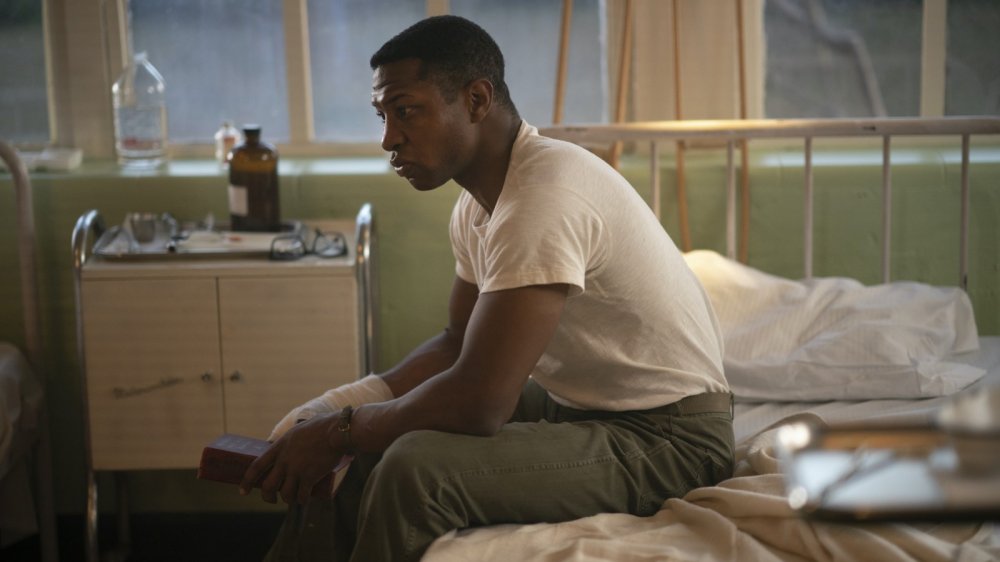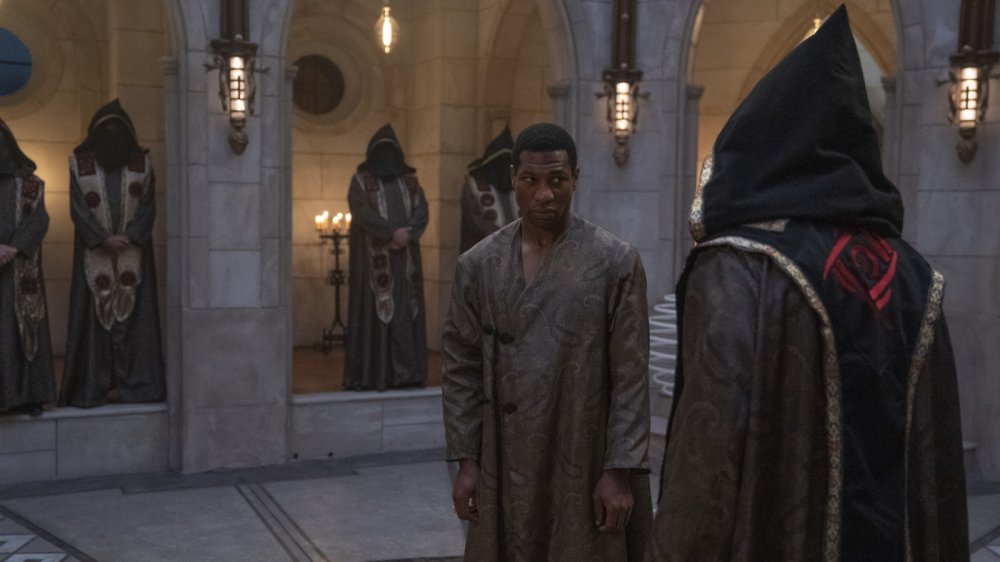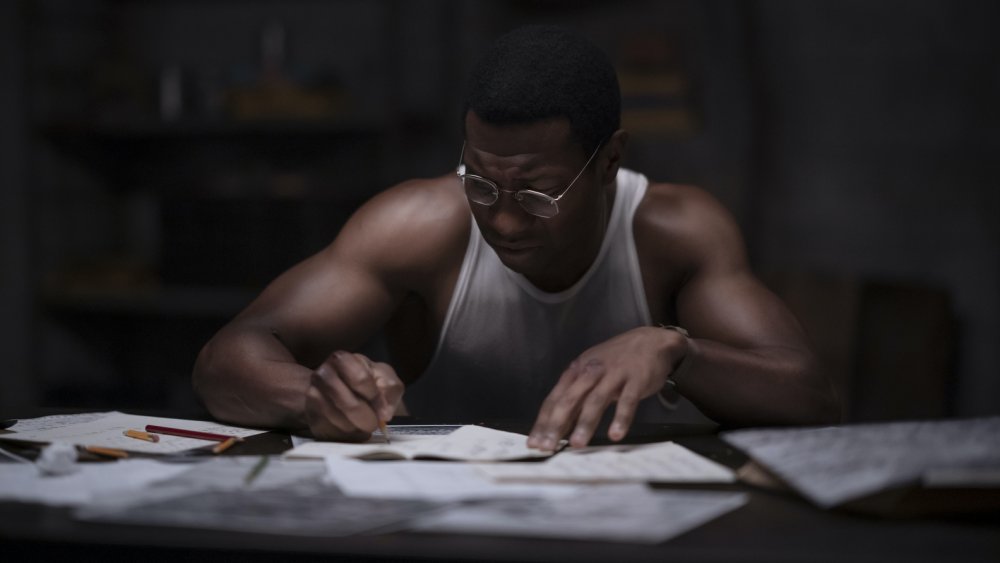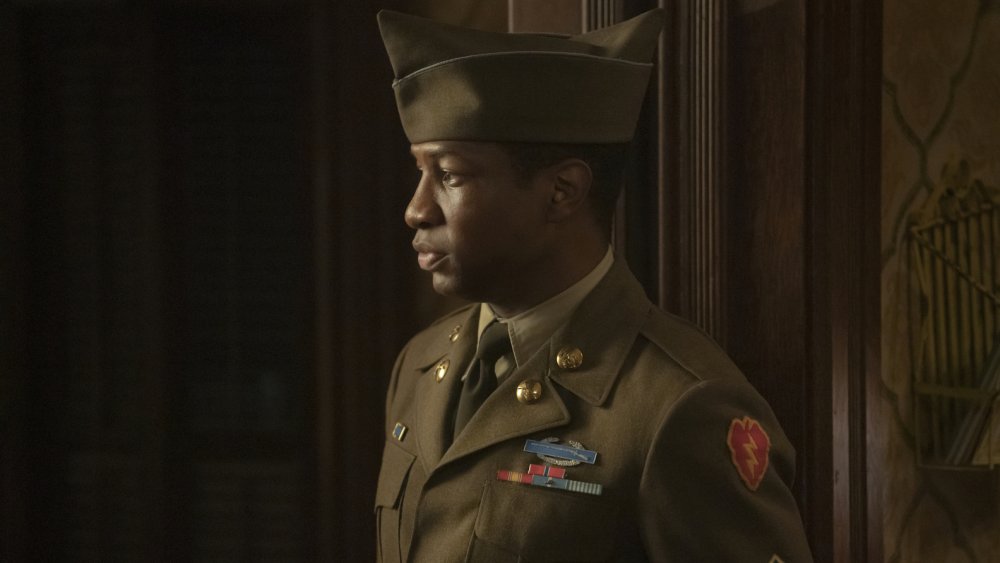Jonathan Majors Talks Season 1 Of Lovecraft Country - Interview
Lovecraft Country finally dove deeper into the psyche of its lead character in its sixth episode, "Meet Me in Daegu" — a riveting one-hour flashback that examines Atticus' traumatic Korean War experiences. It also introduces us to Ji-Ah (Jamie Chung), a former flame of Atticus' who finally steps out of the shadows.
For those who aren't regular viewers of the show, here's the rundown [minor spoilers ahead]: Atticus is a Black war veteran who returns home to find out that his father has gone missing. This sets his tumultuous journey in motion and his trail leads him to Ardham, Massachusetts, where he learns several life-changing facts about his lineage — the most notable being that he's a blood relative to a rich white family that has links to an ancient cult. And as if his world wasn't already rattled enough, he also discovers that ghosts, monsters, and black magic aren't just make-believe things restricted to the pages of the books he loves so much, and he gets up close and personal with all of them in a matter of a few days.
We also know Atticus is haunted by visions from his Korean War past, but it's only hinted at early on. "Meet Me in Daegu" finally lifts that shroud of mystery and we get to see what exactly went down, and as you can guess, it involves bloodshed, a mythical creature, a hair-raising sexual experience, and crushing heartbreak. With Ji-Ah now clearly a major player, it seems we're possibly leading up to a bizarre love triangle. In episode 7, "I Am," Atticus also learns a hard-hitting truth about his father, making their already strained relationship even more complex. With all of these gut-punching reveals, it seems audiences are in for a turbulent season finale just over the horizon. But the major question is, how will Atticus' story end? Or will it?
Atticus is played by Jonathan Majors, who you may know from 2019's The Last Black Man in San Francisco and Spike Lee's Da 5 Bloods. If you've seen the latter film, you'll notice that Majors is no stranger to the subject matter of Black soldiers fighting futile wars on Asian soil. In fact, there are other thematic connections between Lovecraft Country and recent projects he's starred in, something Majors pointed out in a roundtable interview attended by Looper. During this interview, Major dissects his character and drops some hints about where Atticus' story may lead. He also shares his views on legacy, Black masculinity, and reveals what ultimately drew him to the Lovecraft Country project — something he initially thought was a family drama.
Atticus is a man of intellect
You were quoted by the New York Times as saying this series completes your trilogy on black masculinity, along with the brilliant Last Black Man in San Francisco and Da 5 Bloods. I was wondering, can you speak about how black masculinity plays into Lovecraft Country, especially for your character of Tic?
I think what was established in Atticus, "Tic," is that this man contains so many multitudes. He is a man of intellect. He is a man of heart. He's a man of his body. And so, he works and moves through this 10-hour canvas with that. And because of the world that he's been put into — he's a son, he's a lover, he's a soldier, he's an adventurer, he's all of these things. And he's male and he's Black. I was in a conversation with somebody and they said, "Yeah, those three guys, they're different, the war is the same but the mission is different." And it is in some ways to be a corrective to what it is, a corrective and an anecdote to the toxic masculinity, particularly Black masculinity, that society has put on, in many cases, Black men.
And also, the willing chains that many of my compatriots put on ourselves, the limitations we put on ourselves, that we must behave a certain way, or that we must think a certain way. And so, with these three fellows, Atticus allows us to expand that. And it's on a platform where people can see that. And I think it's a very ambitious thing to say, but I find that that is how I would break it down.
So with Tic being all of those things that you just mentioned, as he navigates racism, love, and magic within the world of Lovecraft Country, what do you think is the most pivotal moment for him on this journey? And what I mean by that is, the moment that he pushes past fear to really become the man that he was always meant to be.
Wow, I don't think we've gotten there yet. I think the beautiful thing I enjoyed about playing Atticus was that he was discovering things every single day. Every day, he doesn't know that he is going to fall in love with Leti. He doesn't know he's going to find his father. He's searching for his father, but he doesn't know he'll actually find him. That's another thing. He doesn't know Dee is now drawing. He doesn't know these things. He's constantly discovering things. And I think the moments that he learns the most are the moments when he's at the highest level of fear. Actually, the thing about Atticus is fear does not bother him. He feels it. But... it's like he can move through it.
He has so much emotion inside of him. He has so much hurt inside of him. And so when he gets put up in a place where that hurt is right in his space, that's a different type of fear. That's man versus self. That's what Atticus' story is. This story is Atticus versus Atticus. There's magic, there's all these things, but Atticus' journey is him versus himself. He's dealing with his own s*** this entire time. I think it's the moments in which he allows his heart to break, that's where he begins that rotation to the man that he's going to be. And he does that periodically throughout the story. And I think we're only halfway there. I even think at the end of the story, there's still more that he can learn.
Legacy can be uncomfortable thing to wrestle with
The whole show is about this quest to take back your birthright. But there's also the question of all the other things you inherit: the pain, the hurt, the trauma. Can you talk a little bit about how that inheritance of these ancestral traumas and curses played out, specifically for you and your character, and how you sort of worked through expressing that onscreen?
That's a beautiful question because it's uncomfortable to answer. Because the things that Atticus is dealing with is — legacy. When I think legacy, I think, "Oh, we're talking about the tribes of Africa and we're talking about the dynasty of the Obamas" and all these things. I think where people really f*** up is that legacy is everything. Legacy is the slavery. Legacy is... it's not just Michael Jordan and Michael Jackson, so we don't just get that stuff. We get all of it. And particularly to the Freeman bloodline. There is the fact that Atticus is made up of half slave, half Freeman. It gets revealed in episode two that the Freemans were never slaves. It was Atticus' mother's side that were slaves.
So he's walking around inside of him, a free man and an enslaved woman. He is also, no spoilers here, part of the Braithwaite family. That in and of itself, to me, is the most uncomfortable thing to wrestle with as an African American: that you are probably the descendant of the same people who enslaved you. And you can't deny that. You are that. You are that as well. You have that Scottish, German, English, et cetera, in you. That's what happened with Atticus. And so, to take all that on and then to decide what to do with it — how to either add to it, how to mitigate it, how to live with it — is the story of our characters. Then you have the legacy that you are going to push forward. That's the story of Atticus. That's what each episode is. How does he continue his legacy, correct things, fix things, and make things better?
All of the main characters have personal relationships to sci-fi that has fundamentally shaped their worldviews in a way that makes the sudden appearance of magic, demons and ghosts, something that doesn't really make any of them falter. How do you think Atticus' relationship to sci-fi really does come to ground him, particularly as the season goes on — it's less of a fanciful, "Oh, look at what's happening" and more like, "We are in very serious mortal peril."
When I think of mortal peril, I think of children. I think of my daughter. I think of my young cousin who will say, "There's a monster under the bed, daddy." Or, "I'm scared to walk through this high grass, daddy, because X, Y, and Z." She believes in Shoggoth. She's pure. She believes in all these magical things and she's extremely, extremely grounded. That speaks to the purity of our characters, which is one of the reasons I think people can connect to the Freeman family and the Lewis family, the Baptiste family, and even the Braithwaites. The characterization of these people is that they have lived lives and have somehow encapsulated themselves in a way that they truly believe. It is a religion in a way. The same way folks will believe in the Holy Ghost. It is a part of them. It's not outside of them.
So when Atticus says it's a struggle, it is a struggle, you know what I'm saying? He's already seen one in flesh, but he's seen one in his brain. He dreams about these things. Now the question is, the sequence at the top of the show, is this a recurring dream that Atticus had? Does he see these things all the time? Is it the dream or is he remembering? We use Dracula. It's our lexicon. It's our way of speaking to each other. Uncle George is explaining the peril we're in. And Atticus says, "Dracula, you're talking about Dracula?" He's like, "Yeah." Atticus says, "Okay, cool." And that's our language. We understand that. Okay, cool. And it's not a metaphor. It is Dracula. "Okay. I got it. These guys are vampires. We need light. We got it. Let's get busy."
Lovecraft Country is fantastical and surreal
When you first heard about Lovecraft Country, what was the most alluring thing about both the script and the book that drew you in and made you realize that you wanted to be part of this project? Which moments jumped out at you the most?
I think honestly it was Atticus. The story was given to me to look at Atticus. I have a very investigative nose as I'm reading it. And when I get to Atticus, which is very early on. It was at the beginning. I go, "Wait, wait, wait, wait, wait." The way he's described, he's a war veteran — a Korean War veteran, which is important because the Korean War is quite different than the other American wars. He's a Korean War vet as well as a Black man and he's traveling, okay. That's not something I've seen before. And he's a bibliophile. Okay. That's not something I've seen before. And he's searching for his father and I go, "Oh, well that's something I understand." That was enough for me.
I entered the project with the mindset that it's a family drama. We're going to deal with dad, uncle George, Leti — all these things. And as I began to read, as we began to move through the scripts, the story became more and more complex, and more and more unreal and fantastical and therefore, surreal — and therefore what I call dark s*** reality. Which is what I am into, so the challenge of it was great. I was interested in giving it a go.
New episodes of Lovecraft Country air every Sunday at 9PM on HBO.



